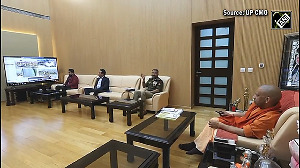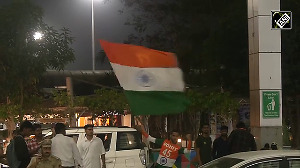The government said on Wednesday that it would aim at preventing a repeat of Bhopal gas leak case, a verdict on which a storm is raging on the light punishment given to those convicted.
With the government coming under pressure on the issue, Law Minister M Veerappa Moily said the new National Litigation Policy, released on Wednesday, proposed a stringent monitoring and review mechanism for all government litigations so that cases such as the Bhopal gas tragedy are noticed before it was too late.
In its verdict early this month, a local court in Bhopal had sentenced seven convicted persons to two years jail following the Supreme Court judgement reducing the charges in the case was attacked.
Under the National Litigation Policy that would come into effect from July 1 this year, Moily said the government would categorise and group court cases so that those contesting on behalf of the government could prioritise them.
"If this (mechanism) is in place, ultimately, constant review, prioritising and categorisation will track everything. Maybe cases like the Bhopal one will not be repeated in this country. That is the target of this (policy)," he said.
The minister also noted that "a sensitised and sensitive" government would represent all these cases so that there was "no delay or neglect" at any stage (in cases like the Bhopal catastrophe).
Moily said these systems would be in place so that the delay witnessed in the Bhopal case did not become a norm as "justice delayed is justice buried".
Asked about the curative petition that the Group of Ministers on the Bhopal case was considering, Attorney General G E Vahanvati, who was present, said the law minister had only made "a suggestion" before the GOM and it was not "a considered opinion".
Vahanvati said the GOM's report had to first go to the Cabinet, which had to approve the suggestion.
He claimed the 1996 Supreme Court order in the Bhopal gas leak case was "wrong as a matter of law."
Based on the available evidence, the Supreme Court had in 1996 reduced the charge against the accused in the Bhopal case from culpable homicide not amounting to murder to causing death by negligence.
"I am not criticising the judgment... I am entitled to tell you that it is wrong. I say it as a matter of law. I believe there are contradictions in the judgment and there are lots of material that have come up post that judgment," he said.
Vahanvati pointed to evidence that people knew there was a flaw in the (Union Carbide) plant and as a matter of economy they did not rectify the flaws.
He said the curative petition was a mechanism created by the Supreme Court itself to correct its own errors and eliminate injustice caused by its earlier orders.





 © 2025
© 2025